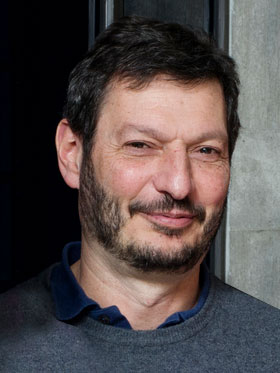Control Seminar
Easy, hard or convex?: The role of sparsity and structure in control oriented machine learning
This event is free and open to the publicAdd to Google Calendar

Abstract: Arguably, one of the hardest challenges faced now by the dynamical systems community stems from the exponential explosion in the availability of data, fueled by recent advances in sensing and actuation capabilities. Simply stated, classical techniques are ill equipped to handle very large volumes of (heterogeneous) data, due to poor scaling properties, and to impose the structural constraints required to implement ubiquitous sensing and control. For example, the powerful Linear Matrix Inequality framework developed in the past 20 years and associated semidefinite program based methods have proven very successful in providing global solutions to many control and identification problems. However, in may cases these methods break down when considering problems involving just a few hundred data points. On the other hand, several in-principle non-convex problems (e.g identification and robust control of classes of switched systems) can be efficiently solved in cases involving large amounts of data. Thus the traditional convex/non-convex dichotomy may fail to completely capture the intrinsic difficulty of some problems.
The goal of this talk is to explore how this “curse of dimensionality” can be potentially overcome by exploiting the twin “blessings” of self-similarity (high degree of spatio-temporal correlation in the data) and inherent underlying sparsity, and to answer the question of “what is Big Data in dynamical systems theory?”. While these ideas have already been recently used in machine learning (for instance in the context of dimensionality reduction and variable selection), they have hitherto not been fully exploited in systems theory. By appealing to a deep connection to semi-algebraic optimization, rank minimization and matrix completion we will show that, in the context of systems theory, the limiting factor is given by the “memory” of the system rather than the size of the data itself, and discuss the implications of this fact. These concepts will be illustrated by examining examples of “easy” and “hard” problems, including identification and control of hybrid systems, data driven control and learning Koopman operators. We will conclude the talk by exploring the connection between hybrid systems identification, information extraction, and machine learning, and point out to new research directions in systems theory and in machine learning motivated by these problems.
Bio: Mario Sznaier is currently the Dennis Picard Chaired Professor at the Electrical and Computer Engineering Department, Northeastern University, Boston. Prior to joining Northeastern University, Dr. Sznaier was a Professor of Electrical Engineering at the Pennsylvania State University and also held visiting positions at the California Institute of Technology. His research interest include control oriented machine learning, robust identification and control of hybrid systems, and robust optimization. Dr. Sznaier is currently serving as chair of the IFAC Technical Committee on Robust Control, Founding Editor in Chief for the Control and AI section of the journal Frontiers in Control Engineering, and General Chair of the 2024 Symposium on Systems Identification (SysId2024). Past recent service include Program Chair of the 2017 IEEE Conf. on Decision and Control, General Chair of the 2016 IEEE Multi Systems Conference, and Chair of the IEEE Control Systems Society Technical Committee on Computational Aspects of Control Systems Design (2013-2017). He is a distinguished member of the IEEE Control Systems Society and a Fellow of the IEEE for his contributions to robust control, identification and dynamic vision. A list of publications and current research projects can be found at http://robustsystems.coe.neu.edu.
***Event will take place in hybrid format. The location for in-person attendance will be room 1311 EECS. Attendance will also be possible via Zoom. Zoom link and password will be distributed to the Controls Group e-mail list-serv.
To join this list-serv, please send an (empty) email message to [email protected] with the word “subscribe” in the subject line. To cancel your subscription, send an email to [email protected] with the word “unsubscribe” in the subject line. Zoom information is also available upon request to Michele Feldkamp ([email protected]).
 MENU
MENU 
